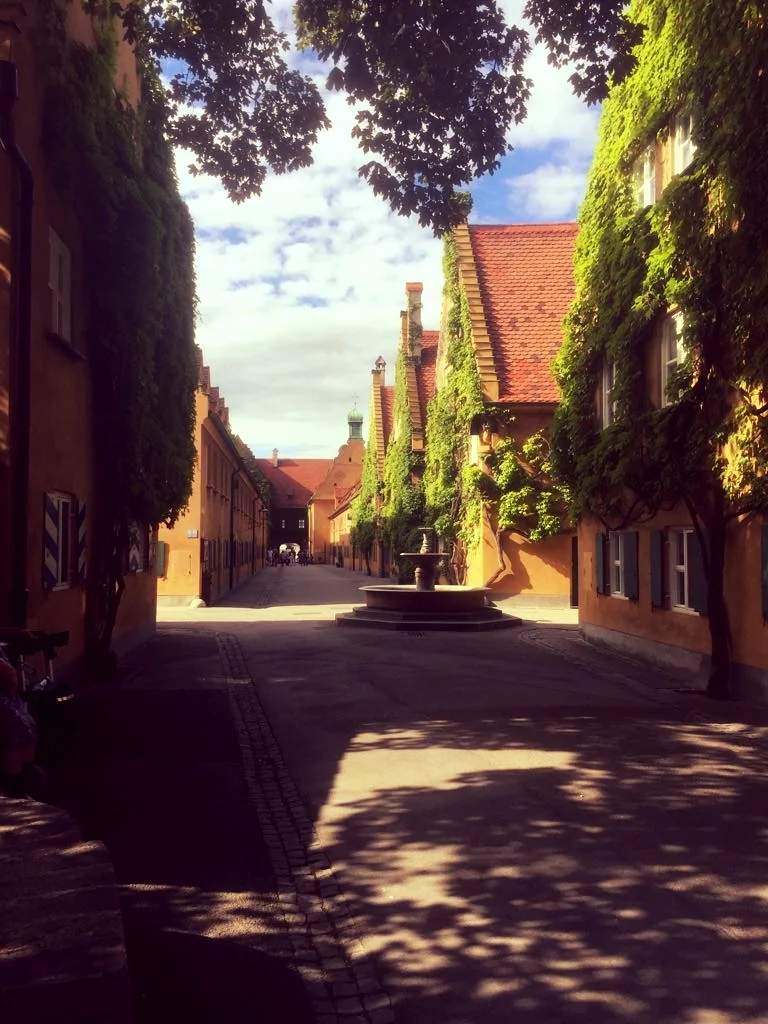Don't Mention The War
The UK is of continual fascination to Germans. The interest in the UK manifests itself in lots of different ways; an obsession over British humour, with Monty Python or Mr. Bean featuring prominently in discussions, a continued preoccupation with the British Royal family which feature heavily in gossip magazines, or simply a desire to decorate homes or clothing in symbols of Britain, such as the Union Flag, red double decker buses or hackney carriages. Brexit has yet to fully extinguish this interest, although it must be said that British culture is not always completely understood. There are still wide spread assumptions about the quality of British food, for instance, that still declare British dishes to be inedible. Although I make the effort to dispute these claims, it is hard to persuade people that Scotch Eggs, Toad in the Hole or Spotted Dick are in fact wonderful when all I have as evidence are some unconvincing google images.
On the British side, Germany is equally interesting. Thousands travel to Berlin to experience the centre of European hipster culture, where, at least in the minds of many British people, the streets are lined with anti-capitalist squats, graffiti festooned walls and every corner turned reveals another variant of hair colouring. Politicians use Germany as benchmark of success, marvelling at the levels of productivity and wondering why it is that zero hour contracts, lack of skilled work and rabid privatisation do not seem to provide the same results. Football fans and pundits point to Germany’s sporting success and question how it is that Die Mannschaft can consistently succeed at major tournaments or why their players do not evacuate their bowels at the mere mention of penalty kicks. However, beyond culture, beyond economics and beyond football, there is one thing that British people are more curious about. Do the Germans ever talk about World War II?
World War II looms large in British culture and it is not difficult to make the case that the global conflict that erupted in 1939 was the foundation story of modern Britain. Symbols of the Second World War can be found everywhere, from Spitfire beer to the craze for Keep Calm and Carry On posters. WWII permeates British culture in so many ways it would be hard to comprehensively list them all here, but look at any national celebration and you will find flyovers from Lancaster bombers, Hurricanes and Spitfires. Discuss what it means to be British and you will certainly hear some reference to Winston Churchill, a man who knew exactly what it meant to be British and capably translated that into rousing oratory that continues to inspire. TV and film, year after year, produces all manner of WWII content from documentaries that compare the best tanks of the war, to counter factual stories such as SSGB and this year the release of Christopher Nolan’s Dunkirk.
The symbols of WWII are deep rooted in the British psyche, like a genetic history. Mention hardship and we have the Blitz. Describe last minute success in the face of overwhelming odds and you will find the “Dunkirk Spirit”. Talk of British independence and you will hear stories of the small island that stood against a terrible foe, alone but unbroken, belligerently taking on all comers. WWII is the story of British resilience and success, which is perhaps why the British find German history so interesting. Britain’s story is one of victory, whereas Germany’s is the story of the vanquished.
The image of German war guilt is one that holds a vast currency in British popular culture. Although not the first, John Cleese’s Fawlty Towers provided a widespread belief that Germans would prefer it if we “don’t mention the war”. Although much of the context of the joke has been simplified, the imagery remains the same. In the early nineties, the TV comedy Harry Enfield and Chums continued on the theme of German war guilt with the character Jürgen the German. Jürgen was a German tourist in Britain who often found himself in intercultural difficulties and felt compelled to apologise for his countries actions during the war, which in turn would often lead to him accidentally outing himself as a closet Nazi. This idea of overt German guilt and closeted fascism is one that gains quick laughs for a British audience.
Any discussion of Germany will inevitably alight on the topic of German war guilt or the idea that Germany cannot always be trusted. It is a rich comedy seam that is frequently mined, but not one that is necessarily meant to offend. There are of course cheap laughs to be gained from jokes referencing WWII, but the context of Germany’s history can be used to make fun of Britain, as well as Germany.
The problem British people now face is that often WWII is the only thing they really know about Germany. Read the comments section of newspaper articles on current events in Germany and within a few lines someone will mention the war. When I go back to the UK, people always ask about German views on WWII, “do they talk about it?” people ask. Sometimes they will simply say “Don’t mention the war” when I tell someone I live in Germany. For the record, yes Germans will sometimes talk about it and even make jokes about it, but frankly it is not the first topic that springs to mind when I am out with my friends.
A few years ago, I took a survey for a workshop, which included a question on what British people knew about Germany. Time and again, there were three responses: Beer, sausages and World War II. In 2013, the BBC made a documentary about a British family attempting to live in Germany, called “Make Me a German”. Two minutes in, the presenter was asked what he was looking forward to finding out and he answered:
“There is quite a tradition of, you know, two world wars and one world cup, you know, that kind of attitude to Germany in Britain and I think it will be quite interesting to find out what they make of us”.
As if to underline this British fascination with WWII, a minute later, when describing their temporary German home the presenter stated:
“We’ve moved to Nuremberg in the heart of Bavaria. It’s famous for its gingerbread, sausages and its Nazi history”.
Perhaps the idea of Germans carrying the burden of war guilt was once a real thing, but evidence of this burden in recent generations is hard to find. That is not to say that Germany has forgotten World War II or the holocaust. The topic is one that is covered extensively during school, not only in history, but in many other lessons. Schools will invite survivors of the concentration camps to speak about their experiences. The idea is not to load new generations with guilt, but to equip them with the knowledge of what extremism, blind obedience, bigotry and inaction can lead to. German history is a lesson to be learned, albeit a complex and at times uncomfortable one.
There is perhaps a lesson too for Britain here, in that understanding all aspects of our history is just as important. I will never advocate forgetting the role played by Britain in WWII, or denigrate the sacrifices made by my grandparents generation. However, I refuse to mythologise the past, to turn defeats into victories or to ignore the roles played by many other European nations in fighting fascism. World War II remains central to the British psyche, perhaps because it is portrayed as the last time we stood for something noble, against great odds. Yet, it should be remembered that we were not alone. Britain may be an island, but we are not always required to think like one.









